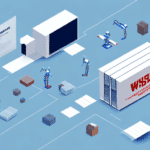Oracle Warehouse Management Cloud (WMS) vs 3PL Central (3PL Warehouse Manager)
In today's highly competitive business environment, efficiently managing warehouse operations is crucial. Utilizing a warehouse management system (WMS) that provides real-time visibility and control over inventory and operations can significantly enhance business performance. Two prominent solutions in this space are Oracle Warehouse Management Cloud (WMS) and 3PL Central (3PL Warehouse Manager). This comprehensive comparison aims to help you make an informed decision on the best fit for your business needs.
Overview of Oracle WMS and 3PL Central
Oracle WMS is a cloud-based solution offering comprehensive end-to-end warehouse management functionality. It seamlessly integrates with other Oracle Cloud applications, such as Order Management Cloud and Transportation Management Cloud, providing a fully integrated supply chain management solution. Estimates indicate that enterprises using integrated systems like Oracle WMS can achieve up to a 20% increase in operational efficiency (Oracle SCM).
In contrast, 3PL Warehouse Manager is tailored specifically for third-party logistics providers (3PLs), offering features like multi-client support, billing and invoicing, and customizable workflows. It provides a unified platform for managing multiple warehouses, customers, and shipments, making it a versatile choice for 3PLs.
Features and Benefits
Oracle Warehouse Management Cloud (WMS)
- Real-Time Visibility: Offers real-time tracking of inventory and warehouse operations, enhancing decision-making and reducing operational costs.
- Optimization: Facilitates optimal use of warehouse space and resources, including labor and equipment, thereby increasing efficiency.
- Intuitive Interface: Features a user-friendly interface that simplifies navigation and operation, enabling quick and informed decisions.
- Integration: Seamlessly integrates with other Oracle Cloud solutions, streamlining the entire supply chain process.
- Advanced Analytics: Provides robust analytics and reporting tools, offering deep insights into warehouse performance and areas for improvement.
3PL Central (3PL Warehouse Manager)
- Customization: Offers extensive customization options to tailor the system to specific business needs.
- Real-Time Tracking: Enables real-time inventory and order tracking for seamless warehouse management.
- Reporting: Includes comprehensive reporting capabilities for better operational insights.
- E-commerce Integration: Integrates with platforms like Shopify, Amazon, and eBay, facilitating efficient order fulfillment and shipping.
- Billing and Invoicing: Streamlines billing processes for both the warehouse and its clients.
- User-Friendly Interface: Designed for ease of use, enabling warehouse staff to operate the system efficiently.
Pricing and Implementation
Pricing for Oracle WMS and 3PL Warehouse Manager varies based on factors such as the number of users, warehouse size, and required customization. Generally, Oracle WMS tends to be more expensive due to its extensive functionality and integration capabilities. However, both solutions offer flexible pricing models to accommodate different business scales and budgets.
Implementation time also differs between the two systems. Oracle WMS, with its comprehensive features, typically requires a longer implementation period. On average, large-scale implementations can take several months, depending on the complexity and size of the warehouse operations (Gartner Report). In contrast, 3PL Warehouse Manager often has a shorter implementation timeline, making it a more attractive option for businesses needing quicker deployment.
Ease of Use and Integration
Both Oracle WMS and 3PL Warehouse Manager are designed with user-friendliness in mind. Oracle WMS offers a comprehensive set of features that, while powerful, may present a steeper learning curve for new users. Its integration capabilities are highly robust with other Oracle Cloud applications, making it ideal for businesses already utilizing Oracle services.
3PL Warehouse Manager provides a more streamlined and intuitive interface, tailored specifically for 3PLs. It integrates smoothly with various third-party applications, including e-commerce and shipping platforms, offering flexibility and adaptability for diverse business needs.
Customer Support and User Reviews
Both solutions provide reliable customer support through multiple channels, including phone, email, and chat. Oracle WMS offers 24/7 support for critical issues, ensuring minimal downtime for large enterprises. Additionally, Oracle provides extensive online training resources and certification programs (Oracle Training).
3PL Warehouse Manager assigns dedicated account managers to each customer, offering personalized support and in-person training sessions for an additional fee. User reviews highlight the efficiency and robust functionality of both systems, although some users note that Oracle WMS can be complex to customize, while 3PL Warehouse Manager may be overly specialized for 3PLs.
Scalability and Future Outlook
Both Oracle WMS and 3PL Warehouse Manager offer scalable solutions that can grow with your business. Oracle WMS is particularly well-suited for large organizations requiring extensive warehouse management functionalities and deep integration with other enterprise systems. According to a Forrester report, Oracle WMS supports scalability effectively, making it a long-term solution for expanding businesses.
3PL Warehouse Manager is ideal for growing 3PLs that need to manage multiple warehouses and customers within a unified system. The platform is continuously evolving, with future updates likely to focus on enhanced customization and broader third-party integrations to meet the dynamic needs of the warehouse management industry.
Conclusion: Which Warehouse Management System Is Best for Your Business?
The decision between Oracle WMS and 3PL Warehouse Manager hinges on your specific business requirements, size, and budget. If you are a large organization seeking comprehensive warehouse management integrated with other Oracle Cloud applications, Oracle WMS is an excellent choice. Its advanced features and scalability can provide significant long-term benefits.
Conversely, if you operate a third-party logistics provider needing a versatile platform to manage multiple warehouses and clients efficiently, 3PL Warehouse Manager is the better fit. Its user-friendly interface and robust customization options cater specifically to the unique needs of 3PLs.
Ultimately, evaluating each system's features, benefits, and alignment with your business objectives will guide you toward the most suitable warehouse management solution.




















